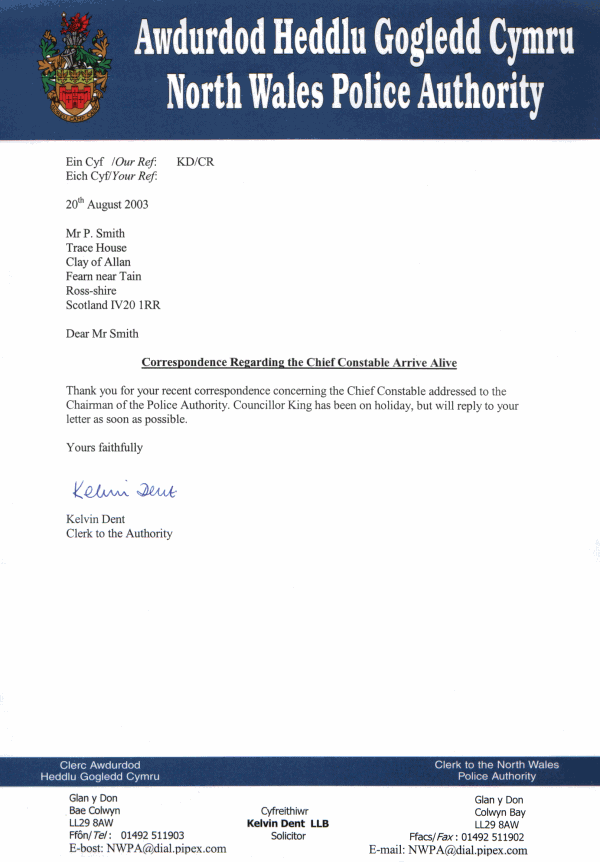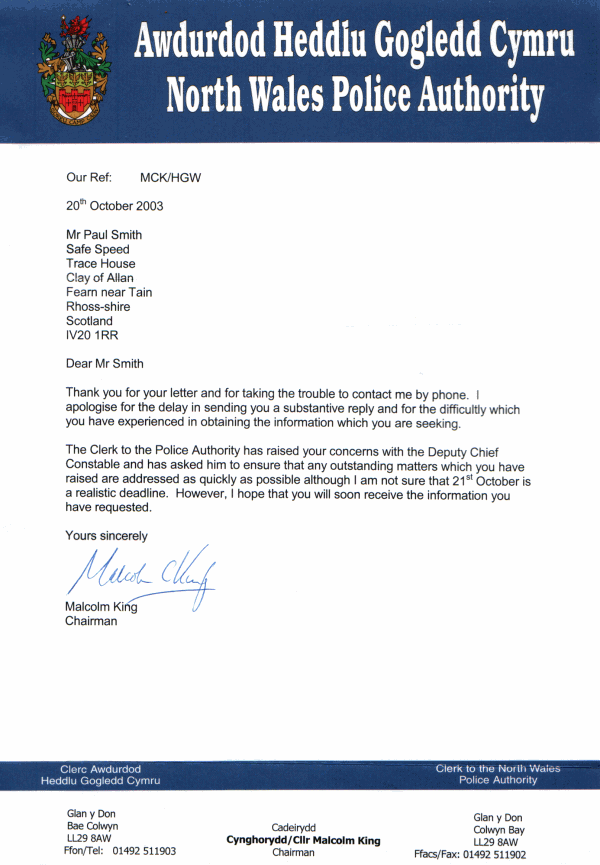
5th
August 2003
Mr King
North
Wales Police Authority
Police
Headquarters
Glan-y-Don
Colwyn
Bay
Wales
LL29
8AW
Dear
Mr King
road
safety : a complaint
I wish
to complain in the strongest possible terms about North Wales Police road
safety policy. I hold Mr Richard Brunstrom responsible. The complaints
are as follows:
1)
It is dangerous to base road safety policy largely or wholly on speed limit
enforcement. Casualty statistics which purport to support such policies
are usually seriously flawed. Fortunately the flaws can usually be exposed
with some basic questions.
2)
I wrote a letter to Inspector Dave Jones on the 10th July 2003 (cc: Mr
Richard Brunstrom and others) seeking clarifications of the claims of success
from the “Arrive Alive” web site, but I have had no reply. I attach a copy.
It is most important that we have answers to those questions.
3)
Arrive Alive publishes falsely based statistics in an attempt to delude
the public that their policies are working. I do not claim that they are
creating false figures, rather that the basis for their figures is excessively
favourable and therefore misleading. Proper answers to my letter to Inspector
Dave Jones would clearly expose most of the errors. [link]
4)
Following a round of unsatisfactory correspondence I finally wrote a letter
to Mr Richard Brunstrom on 30th May 2003. Copy attached. I have had no
reply to this letter. The main question in that letter is so very basic
and fundamental to the North Wales road safety policy that I consider it
vital that the public and I receive a proper answer. The letters are displayed
on the Internet at http://www.safespeed.org.uk/brunstrom.html.
5)
As I understand it, it is the responsibility of the Police to enforce the
law in the public interest. If Britain or indeed North Wales were showing
sustained and substantial reductions in road casualties then it would be
clear that the Police strategy was indeed in the public interest. However,
the area wide figures for most types and classes of road casualty are showing
much poorer improvements than we were used to from 1970 until 1993. Indeed,
the most important figure of all, the “fatal accident rate” has stopped
falling altogether despite an average and steady reduction of 5.26% per
annum from 1950 until 1993. But with a decade of camera enforcement of
speed limits the long-term beneficial reduction in the UK fatal accident
rate has stalled. Vehicle improvements, medical improvements and road engineering
improvements continue at the previous pace. Roads use continues to rise
at the previous pace.
6)
Given that there appears to be no road safety benefit resulting from Arrive
Alive's activities, it is grossly irresponsible for the Police to pursue
their policies when the public has clearly had enough. With grave damage
being done to the relationship between Police and public we can only guess
at the consequential effects on all other crime.
7)
I am also deeply concerned about Arrive Alive's operational tactics. I
have had an email report today about a speed trap mounted at the very end
of a 30mph section, catching vehicles accelerating a few yards too soon
as they entered a national speed limit zone. I feel this indicates a desire
to generate fines rather than to slow down drivers in an area of danger.
I sincerely
hope that it is clear from the tone and the content of this letter that
my primary concern is road safety. I have yet to see any convincing evidence
that speed cameras contribute to road safety at all, and when they are
coupled with a reduction in traffic patrols it does not surprise me to
see an increase in dangerous behaviours on the road.
The
UK achieved the safest roads in the world a decade before we had speed
cameras. In those days we knew how to improve road safety year on year
and the figures proved that policy was effective. Now we have speed cameras
everywhere and the road safety results are disappointing at best.
I look
forward to hearing from you in due course.
Yours
sincerely
Paul
Smith |

